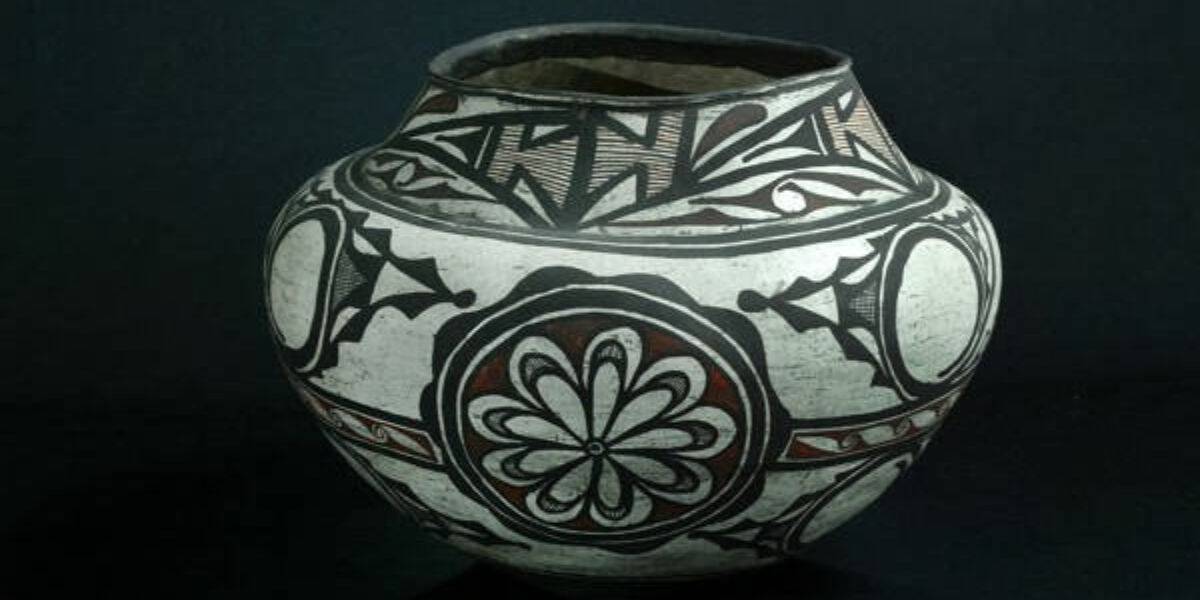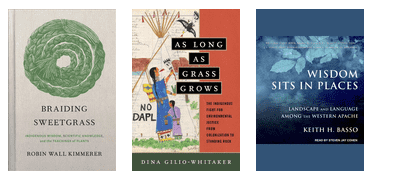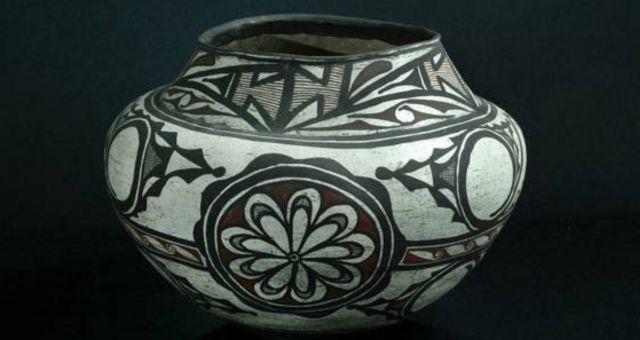
During the 1800s water jars or containers featured abstract designs of rain, vegetation and animals associated with water. This particular abstract design features parallel lines that represent rain and slightly coiled circles that represent a ceremonial drumstick. This Zuni storage jar is an artifact in the collection of The Children’s Museum of Indianapolis.
When is Indigenous Peoples’ Day?
Indigenous Peoples’ Day is the second Monday in October. It recognizes the resilience and diversity of Indigenous peoples in the United States. The day provides an opportunity to intentionally remember and learn about Indigenous histories and cultures. Not currently a national holiday, many American states and cities observe it.
Isn’t that Columbus Day?
Columbus Day, a natioanlly recognized federal holiday observing the life of Italian explorer Christopher Columbus, also occurs the second Monday in October. In the last 40+ years controversy about the celebration of Columbus’ legacy, without including information about the harm caused to the Indigenous peoples of the Americas, has steadily built. Recognizing Indigenous Peoples’ Day honors the cultures, events, and stories that have been left out of our national narrative. Learn more about the movement to observe Indigenous Peoples’ Day in the Smithsonian article, Unlearning Columbus Day Myths.
In this video, meet Artist in Residence at the Eiteljorg Museum, DG House (Cherokee of NE Alabama). Listen to a discussion about Indigenous Peoples’ Day.
A number of books written by Indigenous authors share Indigenous perspective for both adults and children. We can help you find them!
For Adults & Teens
First Nations publishes a list of essential reading for anyone interested in learning about the Native American experience. They also publish a list for children.
“Many of us here – as Native Americans, avid readers, activists for improving Native American economies and communities, and as direct participants in the Native American experience – believe that we are uniquely positioned to suggest this reading list,” said First Nations President & CEO Michael Roberts.
First Nations indicates on the list which titles are especially good ones to start with. Here are a few of their selections. See the full list. Explore our collection more at Finding Books by Indigenous Authors.
Bury My Heart at Wounded Knee by Dee Brown
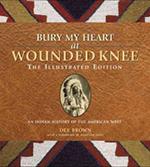
“Eloquent, heartbreaking, and meticulously documented, Bury My Heart at Wounded Knee follows the systematic destruction of the American Indian during the second half of the 19th century. Using council records, autobiographies, and firsthand descriptions, Brown’s work highlights the voices of those American Indians who actually experienced the battles, massacres, and broken treaties.”
print | e-book | e-audiobook | audiobook CD
An Indigenous Peoples’ History of the United States by Roxanne Dunbar Ortiz
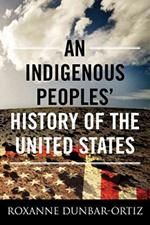
“Historian and activist Roxanne Dunbar-Ortiz offers a history of the United States told from the perspective of Indigenous peoples and reveals how Native Americans, for centuries, actively resisted expansion of the US empire. Dunbar-Ortiz challenges the founding myth of the United States and shows how policy against the Indigenous peoples was colonialist and designed to seize the territories of the original inhabitants, displacing or eliminating them.”
print | e-book | e-audiobook
Do All Indians Live in Tipis?
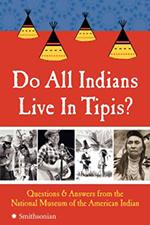
“Debunking common myths and providing information about everything from katsina dolls to casinos and Pocahontas to powwows, Native staff members at the National Museum of the American Indian have handled a wide array of questions over the years. This book presents nearly 100 of their answers. This book counters deeply embedded stereotypes while providing an introduction to diverse Native histories and contemporary cultures.”
print
Everything You Wanted to Know About Indians But Were Afraid to Ask by Anton Treuer
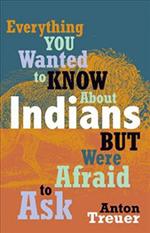
“Treuer, an Ojibwe scholar and cultural preservationist, answers the most commonly asked questions about American Indians, both historical and modern. He gives a frank, funny, and personal tour of what’s up with Indians, anyway.”
print | e-book | e-audiobook | audiobook CD
“All the Real Indians Died Off” and 20 Other Myths About Native Americans by Roxanne Dunbar Ortiz
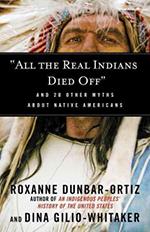
“Dunbar-Ortiz shows how myths about Native Americans are rooted in the fears and prejudice of European settlers and in the larger political agendas of a settler state aimed at acquiring Indigenous land and are tied to narratives of erasure and disappearance.”
print | e-book | audiobook
The Eiteljorg Museum put together a list of suggested reading, listening, and watching. Browse and place holds on some of their recommendations. You can also explore how the fight for climate justice and environmental preservation is tied to tribal sovereignty. From the removal of Indigenous people in order to create national parks to resistance against the Dakota Access Pipeline, each of the books in this book list, Indigenous Thought & the Environment, explores a different facet of a complex relationship.
For Children
Dr. Debbie Reese (Nambé Pueblo) began her website, American Indians in Children’s Literature (AICL) in 2006 to make finding Indigenous books for children easier. Dr. Reese provides American Indian Children’s Literature Best Books Lists each year to help parents and teachers find great books for kids.
Additional lists of best Indigenous books for children:
- First Nations Native American Children’s Books Recommended Reading List
- National Indian Education Association Recommended K-12 Reading List
- American Indian Library Association Youth Literature Award
- EmbraceRace: How to Choose Excellent Children’s Books By and About American Indians by Dr. Debbie Reese
Enjoy the video read aloud We Are Water Protectors read by the author, Carole Lindstrom (Anishinabe/Métis and member of the Turtle Mountain Band of Ojibwe). The book earned a 2021 Jane Addams Children’s Book Award and appears on the 2020 American Indians in Children’s Literature (AICL) Best Books List. The book’s author, Michaela Goade, won the 2021 Caldecott Medal for illustration.
Best Picture Books for Kids by and about American Indians
A guide to some of the best picture books by and about American Indians recommended by The American Indian Library Association, American Indians in Children’s Literature (AICL), or firstnations.org.
